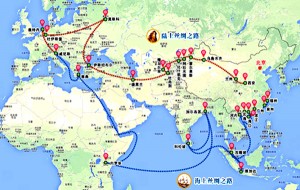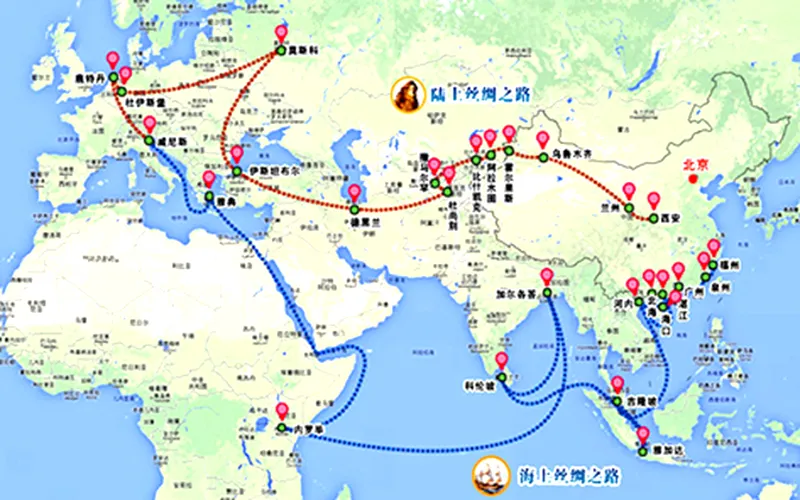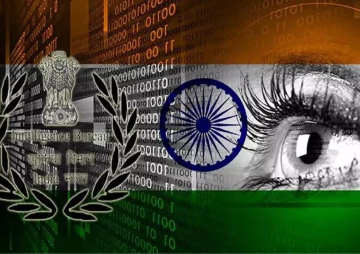The ongoing South Asia trip by Chinese President Xi Jinping attaches great importance to China’s growing maritime dimension in the Indian Ocean. Beginning his tour with the Maldives -- a first by a Chinese leader -- Xi secured the island nation’s support in the new ’21
st Century Maritime Silk Route’ (MSR) initiative. Given that Sri Lanka has already shown keen interest in joining the MSR initiative, the highlight of Xi’s South Asia tour would be the outcome of his visit to India from Wednesday.
Xi put forward the idea of a MSR while addressing the Indonesian Parliament during his maiden trip to Southeast Asia in 2013. Xi was the first foreign leader to address the Indonesian parliament. His speech signalled Beijing’s desire to engage further with the Southeast Asian nations. Emphasising on ’win-win’ cooperation between China and ASEAN, Xi pushed forward the agenda of regional economic integration and improved connectivity between the nations. Putting forward the concept of the MSR,
Xi stressed that "Southeast Asia has since ancient times been an important hub along the ancient Maritime Silk Route. China will strengthen maritime cooperation with ASEAN countries to make good use of the China-ASEAN Maritime Cooperation Fund set up by the Chinese government and vigorously develop maritime partnership in a joint effort to build the Maritime Silk Road of the 21
st century."
The MSR was then reiterated by Premier Li Keqiang during his trips to Brueni, Thailand and Vietnam, underpinning Xi’s call for improved connectivity and regional integration. Both Xi and Li received favourable responses to the MSR and on increasing connectivity, laying the basis for Beijing to pursue other nations along the proposed route through the Indian Ocean.
 Source:
Source: Xinhua
While the Chinese proposal on MSR lacks clarity with respect to its intentions and details about the project,
information1 available so far indicates that establishment of free trade zones, building port infrastructure and increasing connectivity is at the core of the project. Apart from the support being offered through the China-ASEAN Maritime Cooperation Fund, Beijing in May this year set up a 10 billion Yuan ($1.6 billion) fund to support the ambitious project linking the Pacific and the Indian Ocean. The MSR has become a key initiative in Beijing’s maritime policy, reflecting its rising naval profile and the desire to expand its reach and access out of the Western Pacific and into the Indian Ocean.
Although the importance of the MSR is laid on promoting greater economic integration and boosting connectivity through the Indian Ocean, the strategic significance of such a project cannot be underestimated. Xi’s trip to the Maldives speaks volumes about Beijing’s seriousness toward the MSR and the importance of winning the support of these strategically located islands in the Indian Ocean.
For India, the MSR is more of a strategic concern than an economic opportunity. By promoting connectivity and investing in building infrastructure and developing ports in the Indian Ocean Littorals, China’s access and reach through the region will grow immensely. Besides increased connectivity in the region, the proposed route will provide China with an incentive to expand its presence to the Bay of Bengal.
New Delhi has always been wary of Chinese presence in the Indian Ocean and the MSR is only likely to add to the uncertainties given the lack of details in the proposed concept.
While the initial reaction from New Delhi towards the initiative has been positive, officials have requested more details on the project before formally accepting or declining Beijing’s
invitation.
Even though most of the Southeast Asian nations have indicated their interest in joining the MSR, the unresolved territorial disputes in the Western Pacific shadow Beijing’s initiative on the MSR. Coupled with lack of information on the project, the MSR can be perceived as a strategic move to dominate the maritime domain through economic and cultural influence and expand Beijing’s presence throughout the Indian Ocean.
For New Delhi, the issue is crucial with important Sea Lines of Communication passing through the Bay of Bengal and the Indian Ocean. A dominant Chinese presence in the Indian Ocean would mean a significant strategic influence through the region -- a development that New Delhi cannot ignore at any cost.
With a successful trip to the Maldives, Xi is most likely to bring up the topic of India joining the MSR when he meets Prime Minister Modi later this week. India must weigh its strategic consequences should this concept materialise with the support that Beijing seeks. India has to fight the dilemma between economic opportunities and increased Chinese strategic presence posed by the initiative. It must provide a framework explaining New Delhi’s approach and outlook on Beijing’s Maritime Silk Route of the 21
st Century.
1. Also see, Ananth Krishnan, ’Beijing’s ’new Silk Road’ to boost maritime, road links’,
The Hindu, August 11, 2014
The views expressed above belong to the author(s). ORF research and analyses now available on Telegram! Click here to access our curated content — blogs, longforms and interviews.





 PREV
PREV

